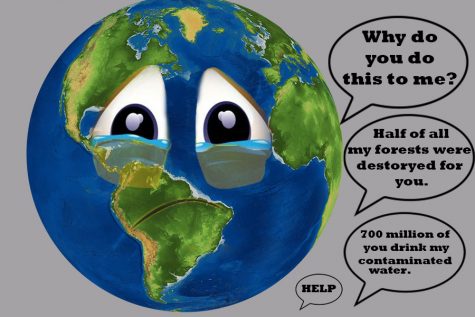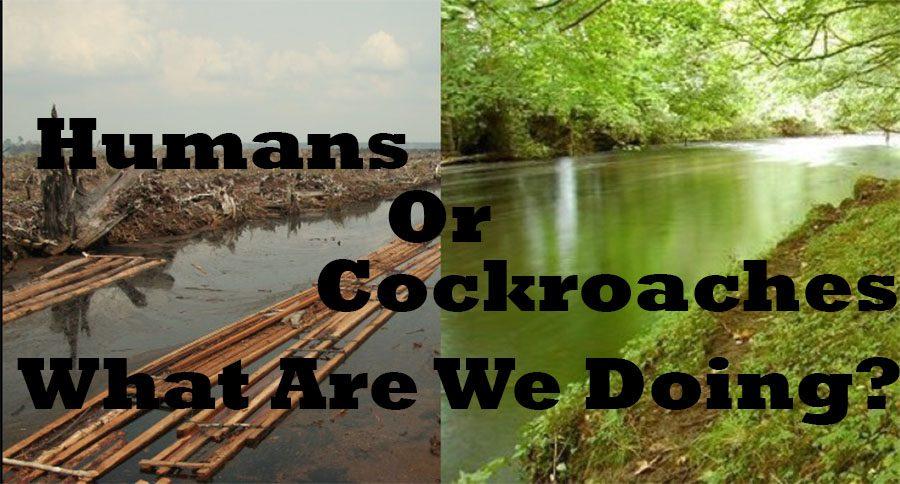The Environment is Headed for Retirement
Our Greed & Apathy are Killing the Planet
September 23, 2016
I have always had a rather apathetic outlook towards the scientifically asserted, “earth-shattering” environmental issues which continue to “plague” the globe every day. I, along with a vast majority of the population, lacked the information essential to understanding these issues and, frankly, without that, it is just hard to care. Global warming, deforestation, it’s actually quite overwhelming — it’s easy to wave a finger assuring myself that is not my concern.
The A.P. Environmental Science course offered at Broomfield has already revolutionized my outlook on the Earth and its well being, and I recommend all students at Broomfield to take the course at somepoint in their years.
Admittedly, environmental issues can be
pretty dry. Most of them won’t spontaneously spark a fiery passion for change. The most intriguing and inspiring issues are those that directly affect people or the things they care about. Those fortunate enough to have taken an environmental course can recognize, more than most, that the environment is quite literally sick with a life threatening disease: overzealous humans.

Many people will turn a blind eye to the pressing issues of their generation, relying on habitual cop-out excuses like, “Oh, that is a problem for future humans; they’ll figure it out.” I am not so naive to think every person adopts this same lackadaisical attitude, but I’ve heard countless adolescents my age express some variation of this opinion.
Gus Speth, a United States environmental lawyer and advocate, articulates the bottom line in environmental science today. An insatiable economic greed from competing and growing world powers is accelerating and perpetuating many environmental issues at unprecedented levels.
“I used to think the top environmental problems were biodiversity loss, ecosystem collapse and climate change. I thought that with 30 years of good science we could address those problems. But I was wrong. The top environmental problems are selfishness, greed and apathy…”
To regurgitate statistics that exhibit how detrimental today’s levels of consumption are and not offer a solution may be futile. However, it would be remiss of me if I did not acknowledge a few facts. At the current pace human development is moving, 1.5 planet earths are needed to sustain our lavish lifestyle. In around fifteen years it is projected that figure will surpass two planet earths (Thewordcounts.com). Regardless of one’s disposition regarding environmental ethics, it is irrefutable that current world habits are growing increasingly unsustainable.
Everything is rooted in recent unparalleled human population growth that has attributed to myriad negative environmental issues: “In the last 200 years, we have added 2.3 trillion tons of carbon dioxide in our atmosphere, half of this amount was added in the last 30-35 years” (thewordcounts.com).
Many corporations and private entities will forward their selfish personal agendas, at the expense of the environment and public health. It boils down to where they can squeeze or spare a quick buck. How does this go unnoticed? “Trusted” conglomerates, for example, Walmart is the worst perpetrators of unethical environmental practices. Until recent widespread public knowledge, few people were even aware of these shady business models and just how harmful they can be to the world:
“In 2005, Wal-Mart agreed to become a corporate leader in the environmental movement by slashing its carbon emissions. Since then, however, the emissions have actually increased by 14%. Walmart is easily one of the biggest polluters in the country, with an annual output of 45 million metric tons of C02” (care2.com).
Again, when statistics are cherry-picked and used to support opinions in somewhat of an editorial, it is easy to ignore potential implications. In essence: why should we care? These issues cannot be reversed overnight. This is often why everyday people feel powerless and as though nothing they do can make a difference. The longer we retain current habits, the harder they will be to reverse, and the more “normal” the subjugation of Earth will become. The next time an opportunity to reduce harm to the environment arises, (no matter how seemingly insignificant) consider the future of the human race. Take it from someone who used to scoff at tree huggers and environmental spokespeople alike, Earth is important.





